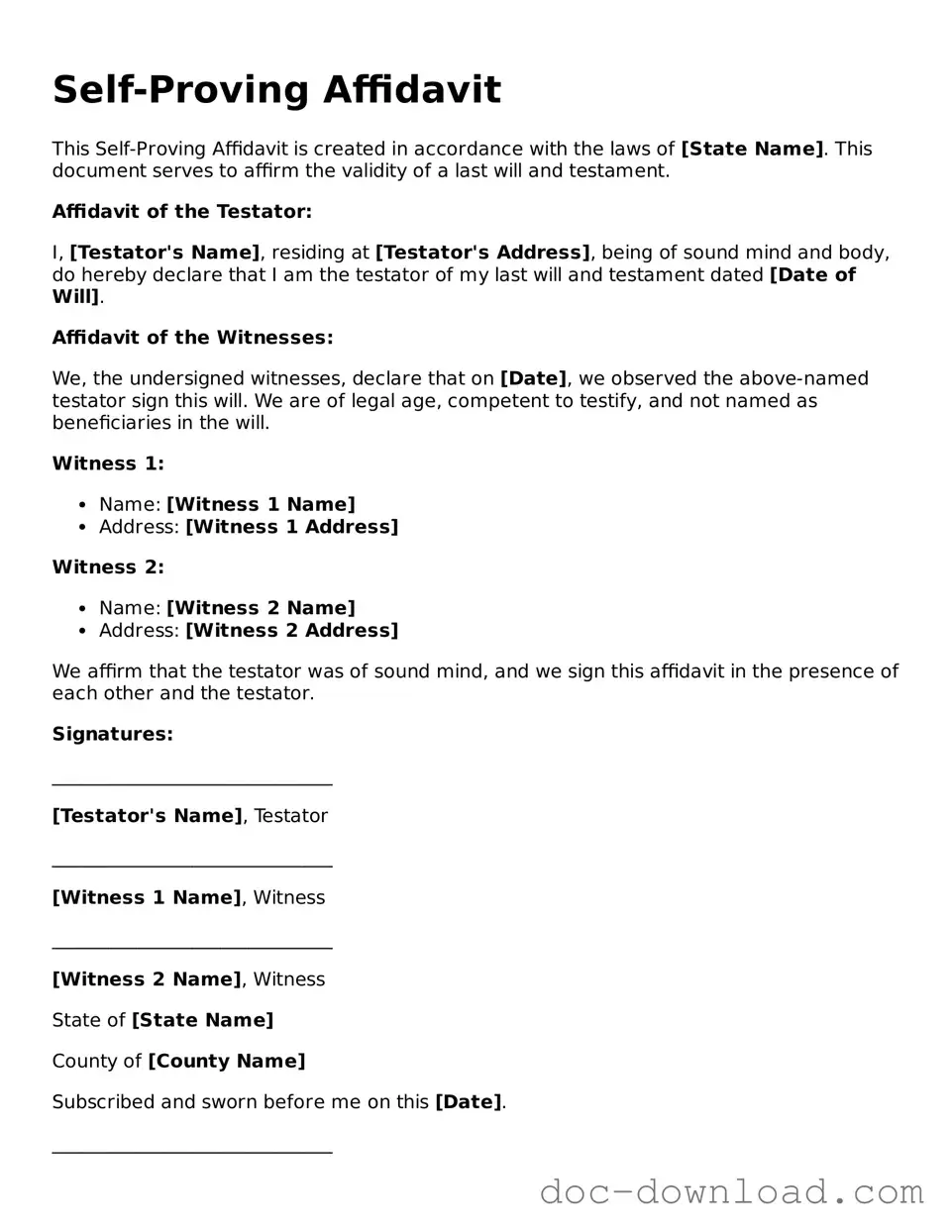Printable Self-Proving Affidavit Template
When it comes to ensuring that your last wishes are honored, the Self-Proving Affidavit form plays a crucial role in the estate planning process. This legal document acts as a powerful tool, providing a way for your will to be validated without the need for witnesses to testify in court. Essentially, it streamlines the probate process, making it easier for your loved ones to manage your estate after you pass away. By including a Self-Proving Affidavit, you not only affirm the authenticity of your will but also enhance its credibility, which can alleviate potential disputes among heirs. This form typically requires the testator, or the person creating the will, to sign it in the presence of a notary public and, in some cases, witnesses. The result is a legally binding document that serves to confirm that the will was executed voluntarily and with sound mind. Understanding the ins and outs of this form can empower you to make informed decisions about your estate, ensuring that your wishes are respected and carried out as intended.
State-specific Guidelines for Self-Proving Affidavit Forms
Similar forms
A Self-Proving Affidavit is similar to a Will in that both documents serve to express an individual's wishes regarding their estate after their passing. A Will outlines how a person's assets should be distributed, while a Self-Proving Affidavit provides proof that the Will was executed correctly. This affidavit helps streamline the probate process by confirming the validity of the Will without requiring witnesses to testify in court. In essence, both documents work together to ensure that a person's intentions are honored and legally recognized.
In navigating various legal processes, understanding the essential documents is crucial, and while the Self-Proving Affidavit is significant for establishing the validity of a will, other forms like the California DV-260 also play an important role in ensuring personal protection and privacy. For those interested in safeguarding their rights through legal avenues, details about the California DV-260 form can be found at californiapdffoms.com/, which offers valuable resources for individuals to begin their journey toward legal protection.
Document Overview
| Fact Name | Description |
|---|---|
| Definition | A Self-Proving Affidavit is a legal document that confirms the validity of a will without requiring witnesses to testify in court. |
| Purpose | This affidavit simplifies the probate process by providing evidence of the testator's intent and the will's authenticity. |
| State Variations | Each state has its own specific requirements for Self-Proving Affidavits, including format and content. |
| Governing Law | In many states, the governing law for Self-Proving Affidavits can be found in the probate code. For example, in California, it is governed by California Probate Code Section 8220. |
| Witness Requirements | Typically, the testator and witnesses must sign the affidavit in the presence of each other, ensuring mutual acknowledgment. |
| Notarization | Many states require that the Self-Proving Affidavit be notarized to be considered valid. |
| Benefits | This document can expedite the probate process, saving time and reducing potential disputes among heirs. |
| Revocation | A Self-Proving Affidavit can be revoked if the testator creates a new will that does not include the affidavit. |
| Storage | It is advisable to store the Self-Proving Affidavit with the will in a safe place, such as a safe deposit box or with an attorney. |
| Limitations | While helpful, a Self-Proving Affidavit does not guarantee that the will will not be contested in court. |
Other Self-Proving Affidavit Templates:
What Is an Affidavit of Affixture - The affidavit can be an essential tool for estate planning for mobile homeowners.
Free Printable Affidavit of Identity - A verified document affirming your legal identity.
In addition to being a vital legal document, the Colorado Mobile Home Bill of Sale form can be easily obtained from reliable sources, such as Colorado PDF Forms, ensuring that all parties involved in the transaction have access to the necessary paperwork for a smooth and compliant sale.
What Happens to a Jointly Owned Property If One Owner Dies in California - This form provides clarity and helps resolve disputes about an individual’s passing.
Sample - Self-Proving Affidavit Form
Self-Proving Affidavit
This Self-Proving Affidavit is created in accordance with the laws of [State Name]. This document serves to affirm the validity of a last will and testament.
Affidavit of the Testator:
I, [Testator's Name], residing at [Testator's Address], being of sound mind and body, do hereby declare that I am the testator of my last will and testament dated [Date of Will].
Affidavit of the Witnesses:
We, the undersigned witnesses, declare that on [Date], we observed the above-named testator sign this will. We are of legal age, competent to testify, and not named as beneficiaries in the will.
Witness 1:
- Name: [Witness 1 Name]
- Address: [Witness 1 Address]
Witness 2:
- Name: [Witness 2 Name]
- Address: [Witness 2 Address]
We affirm that the testator was of sound mind, and we sign this affidavit in the presence of each other and the testator.
Signatures:
______________________________
[Testator's Name], Testator
______________________________
[Witness 1 Name], Witness
______________________________
[Witness 2 Name], Witness
State of [State Name]
County of [County Name]
Subscribed and sworn before me on this [Date].
______________________________
[Notary Public Name], Notary Public
My Commission Expires: [Expiration Date]
